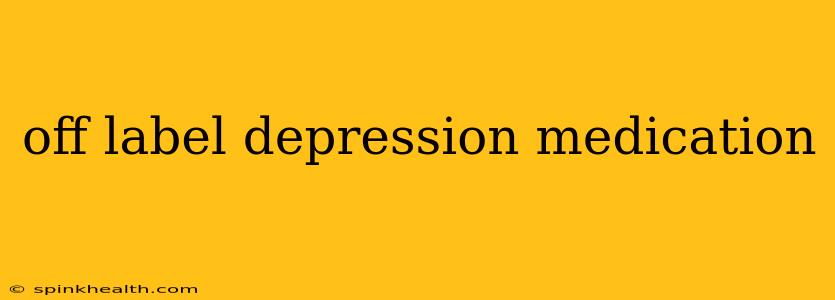Depression, a shadow that can darken even the brightest days, affects millions worldwide. While many effective medications exist, sometimes finding the right fit requires exploring options beyond the FDA-approved label. This is where the concept of "off-label" medication use comes into play. Let's unravel this complex topic, exploring its implications and potential risks and benefits.
It's crucial to preface this discussion by emphasizing that off-label use should only ever be considered under the strict guidance of a qualified psychiatrist or physician. They will carefully weigh the potential benefits against the risks based on your individual health profile and medical history. This isn't a DIY approach; your mental health is paramount.
What Does "Off-Label" Mean?
The term "off-label" refers to using a medication for a purpose other than what it was originally approved for by regulatory bodies like the Food and Drug Administration (FDA). For example, a drug approved to treat seizures might be used off-label to manage certain types of chronic pain or even some aspects of depression. This doesn't mean the drug is unsafe; it simply means its efficacy and safety for that specific use haven't been rigorously tested in large-scale clinical trials.
Why Are Medications Used Off-Label for Depression?
Sometimes, a patient may not respond adequately to FDA-approved antidepressants. Perhaps they experience intolerable side effects, or the approved medications simply don't provide sufficient relief. In these scenarios, a physician might consider an off-label approach, exploring medications that have shown anecdotal evidence or limited research suggesting potential effectiveness for depression. This decision-making process involves a careful balancing act.
What Medications Are Commonly Used Off-Label for Depression?
This is where things get tricky. There isn't a definitive list of medications routinely used off-label for depression, as each case is highly individual. The choice depends heavily on the patient's specific needs, response to other treatments, and potential side effects. Your doctor will consider your entire medical history and current condition before suggesting any off-label options. Remember, this isn't about self-medicating; it's about a collaborative approach with your healthcare provider.
Are There Risks Associated with Off-Label Use?
Yes, there are potential risks. Because off-label use hasn't undergone extensive clinical trials for the specific application, the long-term effects and potential side effects might not be fully understood. This is why careful monitoring and regular check-ups are vital when taking medication off-label. Open and honest communication with your doctor is crucial to address any concerns or side effects that arise.
What are the Potential Benefits of Off-Label Use for Depression?
For some individuals, off-label medication use might be the key to finding effective treatment for depression. When traditional methods fail to provide relief, exploring off-label options, under medical supervision, can open up possibilities for improved mental well-being. It offers a potential pathway to symptom management when other treatments have proven insufficient.
How Can I Discuss Off-Label Options with My Doctor?
The most crucial step is open and honest communication. Express your concerns, describe your experiences with current treatments, and ask your doctor about the possibility of off-label options. Don't hesitate to inquire about the potential benefits, risks, and monitoring strategies associated with any proposed off-label medication. Remember, your doctor is there to support you in finding the best treatment approach.
Is Off-Label Medication Covered by Insurance?
Insurance coverage for off-label medication use varies significantly depending on your plan and the specific medication. It's wise to contact your insurance provider directly to understand your coverage before starting any new medication.
Is Off-Label Use Ethical?
The ethics of off-label medication use are a subject of ongoing debate. While there are potential risks, many argue that withholding potentially beneficial treatments from patients in need is also unethical. The key lies in informed consent and responsible medical practice, ensuring patients understand the risks and benefits before making a decision.
In conclusion, navigating off-label medication use for depression requires a careful, collaborative approach with your healthcare provider. It's not a shortcut; it's a potentially valuable avenue when standard treatments fail to provide adequate relief. Your mental health is a priority, and an informed discussion with your doctor is the cornerstone of finding the best treatment pathway for you. Remember, you are not alone in this journey.

